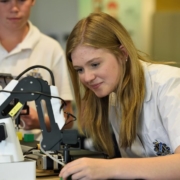Thinking of applying to Oxford or Cambridge?
Students wishing to study at a university in the UK apply through UCAS (Universities and Colleges Admissions Service), which allows students to apply to 5 courses at 5 universities. However, anyone interested in making an Oxford or Cambridge application will have to apply early (by 15th October) and choose which one of these prestigious institutions they wish to put down on their UCAS form (students are not allowed to apply to both).
Oxbridge is the term used to refer to two of the oldest universities in the UK – Oxford and Cambridge. Both offer traditional academic courses where formal assessment is often 100% based on examinations. Both stress the importance of their highly personalised teaching time led by subject experts, with Oxford calling these sessions tutorials and Cambridge referring to them as supervisions.
Colleges and ‘pool’ applications
In contrast to most UK universities Oxford and Cambridge are made up of colleges and applications are made to individual colleges (unless a student makes an open or ‘pool’ application where the student is allocated a college place). Once a student is accepted at a college then that remains their home and central focus of teaching for much of their time at university. Each college decides which applicants will be offered places, co-ordinates the tutorial system, provides accommodation and other facilities and takes overall responsibility for the students’ academic and pastoral care. The university and its departments and faculties set and mark examinations, decide on course content and organise lectures, seminars and practicals. Both universities boast historic architecture and excellent facilities and are situated in attractive places to live, where students enjoy cycling and punting on the rivers.
Specialist subjects
Whilst Oxford and Cambridge share a reputation for world-renowned teaching and research in both arts and science subjects there are differences between them, particularly when it comes to course choice and course structure. Many courses offered by both Institutions have a lot in common but there are particular subjects or combinations of subject that are only offered at one of the Universities. For example, PPE (Politics, Philosophy and Economics) is offered at Oxford and HSP (Human, Social and Political Science) at Cambridge. If you want to study Veterinary Science at Oxbridge then you must apply to Cambridge; those interested in Fine Art must head for Oxford. Cambridge courses (or Triposes) cover subject areas very broadly in the initial years and then offer a wide range of options in which to specialize in the later years. Most science subjects at Cambridge are taught within the Natural Sciences framework, which gives students a broad first year before allowing specialization in the following years. This is in contrast to Oxford where science specialisms are studied from day one.
Supra-curricular requirements
It is important that both students and schools are aware of the knowledge, preparation and research necessary to make a successful application to either of these very competitive universities. Students need to be aware that there are likely to be additional requirements and different deadlines involved. All UCAS applications require evidence of academic achievement (results of examinations that have already been taken) alongside predicted results for forthcoming exams and the personal statement. Oxford and Cambridge may also require students to provide written work and/or sit an admissions test and no student is offered a place without a formal, academic interview. Schools are required to provide predicted grades for any forthcoming examinations and a reference that reflects the academic potential of the student for the relevant course.
Admissions Tests and/or extra work required
In most subjects, at both Oxford and Cambridge, students are now asked to sit admissions tests either prior to being invited to interview or (for some subjects at Cambridge) on the day of the interview. The tests are about applying the knowledge that students might reasonably have been expected to have gained from their school curriculum to new problems. Potential applicants will need to check the registration deadlines and familiarise themselves with the format of the relevant test by looking on the websites.
Anyone applying for a humanities subject may also be asked to submit 1 or 2 essays that they have written at school. These should showcase not only their ability to express academic ideas in writing but also their ability to work through complex ideas in a systematic way.
Supplementary Application Questionnaire
Any student applying to Cambridge University is also asked to complete a SAQ (Supplementary Application Questionnaire), which is submitted online shortly after the UCAS application. The SAQ collects additional information such as which topics have been studied at school and allows students to submit an alternative personal statement, which should focus on the Cambridge course rather than the more general subject area covered by all the UCAS choices.
Interviews
Having looked at the all the information at their disposal Oxbridge admissions tutors decide who should be called for interview. These interviews are different at Oxford and Cambridge from most other universities. Students are interviewed on their own with 2 or 3 academics asking questions and posing problem-solving scenarios that are always relevant to the course applied to. The purpose of the interview is to assess how students think and how they use their current knowledge alongside any additional information given during the interview to solve new problems.
Students living outside the UK/EU – even temporarily
Students attending an international school need to be aware that they may also need to complete some extra elements. Anyone applying to Cambridge who is living outside of the EU at the time of application must complete a COPA (Cambridge Online Preliminary Application) prior to submitting the UCAS form. Students who are not taking UK school qualifications (which include the IB) will need to check the entry requirements very carefully and are likely to be asked to submit a transcript of their high school academic results. Evidence of English language skills will be required and any student receiving an offer must apply for a student visa if from outside the UK.
Overseas v UK fee status
The cost of studying at Oxford or Cambridge is dependent upon whether the student is assessed as an ‘overseas’ or UK home student. At Oxford and Cambridge overseas fee payers are required to pay ‘College fees’ (which cover academic facilities and other services provided by Colleges) in addition to the usual undergraduate tuition fees. This is on top of accommodation and living costs.
UK Study Options specializes in helping students apply to Oxford or Cambridge. See what university application support we can offer you to help you secure a place at one of these excellent institutions.





